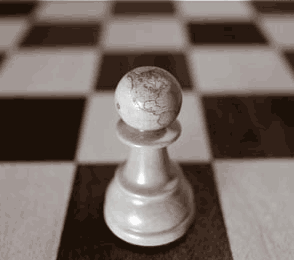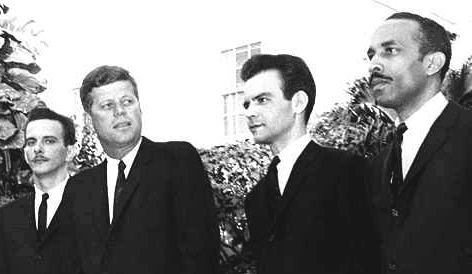intro
attraction
compliance
group work
persuasion
forum
e-mail
recognitions
bookmark this page
home
|
GROUPWORK
GROUPS TEND TO MAKE EXTREME DECISIONS
Explanation
- People who enter a group discussion with extremist views tend to stay put with their views. However, those who enter the discussion somewhat undecided end up being persuaded toward the extremists, because it is socially undesirable to look indecisively neutral (can't you make up your mind? take a stance!)
- Group discussions pool evidence for the extreme views, further encouraging neutral thinkers to polarize.
Experimental Basis
- Risk Analysis (Stoner 1961) > 12 student participants are given problems that measure how much risk they are willing to take. For instance, they may asked to imagine a chessboard configuration where white has the next move, and black is a world-class champion. The students' attention is then directed toward a particular risky move which could beat the champion. Participants must then decide on how much assurance of success they would need to recommend the move for white, on a probability scale ranging from 1/10 (low chance of success) to 10/10 (guaranteed checkmate). Participants first make their decisions on their own.

|
Later, they are gathered into a group discussion in which they must converge on a final assurance rating as a collective. Result: collective assurance rating is closer to 1/10 than the average of the individual assurance ratings; e.g., the group decision is riskier than the individual decisions. However, when the participants are given more important problems relating to health, such as the risks involved in opting for heart surgery, group decisions tend toward extreme caution. So group decisions tend toward extremes.
|
Real-world Basis
- Watergate 1972 > The Nixon vs. McGovern election was a landslide. McGovern had only won one state. It was clear that Nixon had wiped McGovern off the face of the planet. Yet, a few days before the election, Nixon's think tank came up with the brilliant idea to bug the hotels of Democratic Party officials. This ultimately led to Nixon's shameful resignation. Otherwise, Nixon could have been considered a pretty good president in American history.
- Bay of Pigs Invasion 1961 > Seeking to attract brilliant young people to government service, President Kennedy constructed one of the most high-powered cabinets in US history. Among them included Harvard professors McGeorge Bundy and Arthur M. Schlesinger, Rockefeller Foundation president Dean Rusk, and Robert S. McNara, the president of Ford Motor Company. Their IQs soared through the roof. In 1961, US intelligence learned of the possibility that the USSR was planning to launch missiles at the US off the coasts of Cuba. Kennedy's think tank responded by devising a plan that seemed like it could have come out of a video game: they would gather about 1500 anti-Castro Cuban exiles and have the CIA train them to overthrow Cuba. Supplied with weapons, the Cubans were dropped onto the Bahía de Cochinos (Bay of Pigs) and attempted to rally the Cubans, infusing everyone they passed by with rebellious ideas and dangerous spirit. Slowly the exiles would hack their way toward Havana through 40 miles of beach, gathering allies and taking out Castro operatives along the way, and eventually overthrowing the government. Two days after the drop, 100 of the exiles were killed and the rest were in prison, being held for ransom.

|
|
U.S. President John F. Kennedy meets with Cuban exile leaders Jose San Romān, Manuel Artime, and Colonel Eneido Oliva in Palm Beach, Florida, in December 1962. The failure of the Bay of Pigs invasion in 1961 seriously embarrassed the Kennedy administration.
|
The Kennedy administration actually had a Plan B in the event that Plan A failed: the exiles would retreat to the mountains where anti-Castro guerilla forces presided, and regroup until they were ready to launch a second attack. However, this plan was impossible because the U.S dropped the exiles at a location separated from those mountains by 80 miles of uncrossable swamp. Numerous other errors occurred, including one especially embarrassing foul-up where agents in Cuba requested a drop of not more than 1,500 pounds of weapons and sabotage equipment; thanks to US Air Force General Charles Cabell, they received 1,500 pounds of other unrequested material, plus 800 pounds of rice, 800 pounds of beans, and 160 pounds of lard.
10/21/2002 12:50PM Update: Andy Barkett has brought to my attention that this may not be the example of group work gone wrong, because it is generally believed that the Bay of Pigs invasion was actually a minority decision. Apparently McNara was the driving force there. I have not tried verifying any of this, but I will take it on faith. Thanks for the information Andy!
Solutions
- In an important group decision, assign one person to be the Devil's advocate. Regardless of whether that person agrees with what the group is saying at the moment, have the Devil's advocate argue the opposite. This greatly reduces extreme collective decisions.
|
|
|
WHEN OTHERS CAN EVALUATE WHAT YOU'RE DOING, MERE PRESENCE OF OTHERS HURTS PERFORMANCE ON COMPLEX TASKS, BUT ASSISTS ON SIMPLE TASKS
Explanation
- The presence of others physiologically arouses you. Why? Three possible explanations:
- Others make you alert, because they might do something that will affect you.
- We're concerned about how others will evaluate you if we fail.
- Others can be distracting, causing arousal if we're trying to concentrate.
- Arousal makes tasks that are natural to you (e.g. riding a bicycle) even easier. But for complex tasks, arousal makes you flustered and do less well than if you were alone.
Experimental Basis
- Light Failures & Sound Pairs (Zajonc 1965) > Participants are asked to solve problems either alone or in a group. There are two kinds of problems. Simple Problem: given a string of Christmas lights that flash in a motion-like sequence, detect a light failure. Complex Problem: memorize a bunch of nonsensical sound pairs (e.g. "phrigako" goes with "goyjenjijub").
| team? |
simple problem peformance |
complex problem performance |
| alone |
- |
+ |
| group |
+ |
- |
- Animals >
- Feed some chickens a lot of food. Then put them in a room of chickenseed with other full chickens. The chickens will end up eating twice their normal helping of food. The presence of others arouses the chickens to outperform their peers.
- Ants will double their working speed when placed in the presence of other ants.
- A cockroach is placed in a maze-like network of transparent tubes, and needs to figure his way out. Performance degrades when other cockroaches sitting in mini-grandstands are watching him from outside the maze. The presence of others causes the cockroach to waste cognitive energy on worrying about how others will evaluate his intelligence -- energy he could have devoted to solving the complex task at hand.
Real-world Basis
- SAT performance > SATs are typically proctored in rooms of about 30 students. The presence of others will enhance the performance of a student who has prepared for the SAT, but degrade the performance of a student who has not. Appropriate preparation reduces the exam to a simple task, allowing a student to use the presence of others as leverage.
Solutions
- Practice a task before doing it in the presence of others. Then the presence of others will only enhance you.
|
written by William Wu
page last modified Friday, 13-Jun-2003 11:21:49 PDT
|
|